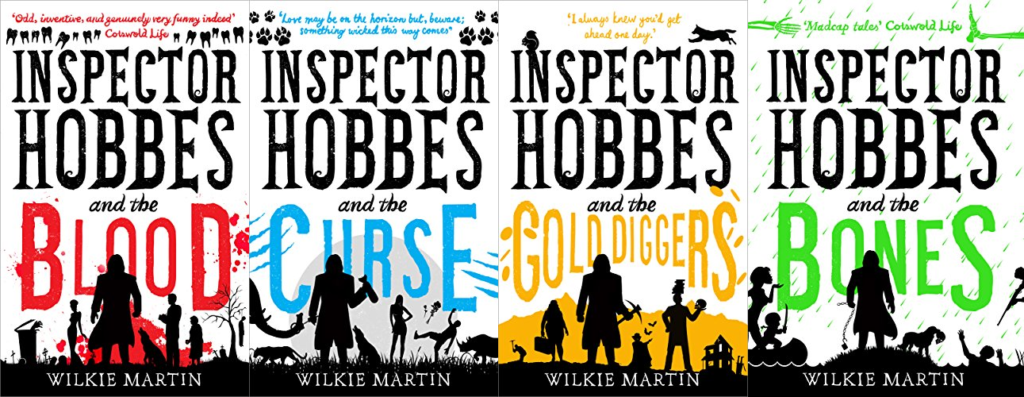Unhuman Series

Wilkie Martin’s Unhuman books are an episodic series set in the fictitious Cotswold town of Sorenchester (loosely modelled on Cirencester), which follow the misadventures of its narrator, Andy Caplet. We soon discover that Andy is a rather poor excuse for a local journalist, something of a slob, and a man with a strong aversion to physical exertion. The real story begins when Andy is sent by his exasperated editor to write a ‘week in the life’ type piece on the local Police Inspector, the titular Hobbes. Hobbes is a larger than life, formidable force of nature, who takes Andy under his sizeable wing. As the duo become embroiled in a murder investigation, Andy’s eyes are opened to some of the more unusual inhabitants and activities occurring in Sorenchester, he also becomes increasingly aware of the peculiarities of Hobbes himself and his retinue of friends and contacts.
Shortly after starting the first book I wondered if I would be able to make it to the end, I was a little overwhelmed by just how much the author had to say, where one word would do, ten were used. The best example of this I can give relates to the cooking of Hobbes housekeeper (very Sherlock Holmes, as is the use of Andy as narrator), she’s a feeder and Andy is appreciative to the point that I think every superlative in the dictionary might have been used to describe the meals she produces throughout the book. We get it, she can cook, move on already. This trend of labouring points repeats in other areas of the book, perhaps not quite so obviously, but it also has the effect of seeming to slow down the story. Another factor adding to that effect is the humour, the Unhuman series is marketed as a lighter take on the fantasy genre so this wasn’t a surprise, however, the jokes felt laboured, a bit like the superlatives it seemed that the author was trying too hard.
Somewhere around the halfway point, I was teetering towards putting the book down and picking something else up, then I laughed. A proper outside laugh as well rather than an inner chuckle, I’m not even certain that it was an intended joke, or just a hapless Andy Caplet moment. Coincidentally at around the same point the pace of the book seemed to lift, some of the more disparate strands of the story began to coalesce into something more tangible, and deeper mysteries were tantalisingly becoming apparent. From this point on my early cynicism began to wane and I found myself warming to the characters, particularly Hobbes, who is actually quite an intriguing creation, there’s some history here which is hinted at in the earlier books but not revealed until much later in the series.
Towards the end of the first book it felt as though the author had relaxed and settled into his own skin a little. The lavish descriptions of each and every meal continued throughout the series, in fact they became almost a signature of the series. It seemed that the author had a genuine fondness for his creations and the relationships between the primary protagonists was infused with the kind of gentle, running jokes that you might share with your family or long term acquaintances. By the end of the series Andy and Hobbes began to feel like old friends and I looked forward to each new episode in their investigations.
- Inspector Hobbes and the Blood (2013) – Amazon – Book Depository
- Inspector Hobbes and the Curse (2013) – Amazon – Book Depository
- Inspector Hobbes and the Gold Diggers (2014) – Amazon – Book Depository
- Inspector Hobbes and the Bones (2016) – Amazon – Book Depository